Deborah Swift's Blog, page 50
June 7, 2011
Giveaway of The Lady's Slipper
I thought it would be nice to bring other geat books to your attention at the same time as promoting my own. You can find more historical fiction writers describing the inspiration for their books on www.royaltyfreefictionary.blogspot.com
The blog features the bestselling Gabrielle Kimm with "The Courtesan's Choice", Ann Weisgarber, winner of the Langum award for Historical Fiction, Charlotte Betts - another award winner for her debut "The Apothecary's Daughter", and fifteen other fantastic reads.
Oh and there's a giveaway of The Lady's Slipper. Just leave a comment on www.royaltyfreefictionary.blogspot.com to enter.
The blog features the bestselling Gabrielle Kimm with "The Courtesan's Choice", Ann Weisgarber, winner of the Langum award for Historical Fiction, Charlotte Betts - another award winner for her debut "The Apothecary's Daughter", and fifteen other fantastic reads.
Oh and there's a giveaway of The Lady's Slipper. Just leave a comment on www.royaltyfreefictionary.blogspot.com to enter.
Published on June 07, 2011 03:11
June 2, 2011
A Poisonous Garden
Whilst researching The Lady's Slipper I had to look into the effects of orchid root when it was ground up and taken as medicine. This involved finding out what kind of solvents might have been used to keep the root in suspension, once it was pulverized, and then what sort of quantities might cause hallucinations or nausea if taken orally. Needless to say, I did not try it myself, but relied on various historical reports and on the medical journals of the time!
Weights and measures were different in the 17th century, for example barley cou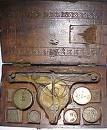 ld be sold in pecks or in pints, and with small quantities such as medicines the basis for an apothecary was the system of the "grain". Weights were as follows:
ld be sold in pecks or in pints, and with small quantities such as medicines the basis for an apothecary was the system of the "grain". Weights were as follows:
One grain
One scruple = 20 grains
One drachm = 60 grains
One ounce = 480 grains
One pound = 12 ounces = 5760 grains
The only liquid measure in the Apothecary System was the liquid grain which was the volume of water weighing one grain, but this was not introduced until much later in 1885. (The picture above shows a 17th century set of weights.)
As a novelist, although I might have wanted to use the term "scruple" for Geofrey Fisk to measure his medicine I chose not to, as "scruple" in modern usage has quite a different meaning.
Until the 20th century lady's slipper root - sometimes called moccasin flower - was used by Native Americans as a nervine and sedative, but modern pharmaceuticals with less side effects have replaced it today.
In Britain there have only been three deaths over the last fifty years that might have been caused by plants, but that does not mean you should not be wary of certain flowers and berries.
Hemlock is the most notorious killer, which causes paralysis of the lungs if ingested. In the Middle Ages a general anaesthetic was made out of hemlock, henbane and opium and used before surgery, particularly during amputations. Hardly surprisingly this kept the patient in a deep sleep for several days until the antidote was administered - vinegar!
Another poison, Deadly Nightshade or Belladonna, was used in the 17th century to increase a woman's attractiveness by dilating the pupils. It was dropped into the eyes, and caused blurred vision. If you were to drink it however you would suffer from convulsions, coma and finally death.

More information about poisonous plants from www.thepoisongarden.co.uk
fascinating talks about Garden lore
http://www.capabilitybowes.com/
Weights and measures were different in the 17th century, for example barley cou
 ld be sold in pecks or in pints, and with small quantities such as medicines the basis for an apothecary was the system of the "grain". Weights were as follows:
ld be sold in pecks or in pints, and with small quantities such as medicines the basis for an apothecary was the system of the "grain". Weights were as follows:One grain
One scruple = 20 grains
One drachm = 60 grains
One ounce = 480 grains
One pound = 12 ounces = 5760 grains
The only liquid measure in the Apothecary System was the liquid grain which was the volume of water weighing one grain, but this was not introduced until much later in 1885. (The picture above shows a 17th century set of weights.)
As a novelist, although I might have wanted to use the term "scruple" for Geofrey Fisk to measure his medicine I chose not to, as "scruple" in modern usage has quite a different meaning.
Until the 20th century lady's slipper root - sometimes called moccasin flower - was used by Native Americans as a nervine and sedative, but modern pharmaceuticals with less side effects have replaced it today.
In Britain there have only been three deaths over the last fifty years that might have been caused by plants, but that does not mean you should not be wary of certain flowers and berries.
Hemlock is the most notorious killer, which causes paralysis of the lungs if ingested. In the Middle Ages a general anaesthetic was made out of hemlock, henbane and opium and used before surgery, particularly during amputations. Hardly surprisingly this kept the patient in a deep sleep for several days until the antidote was administered - vinegar!
Another poison, Deadly Nightshade or Belladonna, was used in the 17th century to increase a woman's attractiveness by dilating the pupils. It was dropped into the eyes, and caused blurred vision. If you were to drink it however you would suffer from convulsions, coma and finally death.

More information about poisonous plants from www.thepoisongarden.co.uk
fascinating talks about Garden lore
http://www.capabilitybowes.com/
Published on June 02, 2011 08:17
May 26, 2011
Romantic Historical Fiction - 40 book Giveaway
 To celebrate its Anniversary the Goodreads Site for Romantic Historical Fiction Lovers is celebrating with a forty book giveaway. The Lady's Slipper is one of the books on offer, along with others by best-selling authors like Gabrielle Kimm, Anne O'Brien, Christy English, Sara Sheridan and of course Emery Lee (who hosts the site)
To celebrate its Anniversary the Goodreads Site for Romantic Historical Fiction Lovers is celebrating with a forty book giveaway. The Lady's Slipper is one of the books on offer, along with others by best-selling authors like Gabrielle Kimm, Anne O'Brien, Christy English, Sara Sheridan and of course Emery Lee (who hosts the site)You can find the Romantic Historical Fiction Group on Goodreads and Facebook
GoodreadsRHFL@groups.facebook.com
Why not join the group and celebrate with us!
Published on May 26, 2011 03:10
May 24, 2011
The Tuesday Tip for writers - Write what you don't know
David Fuller, author of "Sweetsmoke" left this as a comment on the Royalty Free Fiction blog.
"I have a theory with which most teachers of writing disagree. I believe you should write what you don't know. I believe you should do research and learn about other things. Then, when you write, you come into the equation and fill up the work, as it emerges through your own prism. So there it is: Write what you don't know."
I thought this was a great tip, as it is often the way I work. In historical fiction, I often find new aspects to the story this way, and it also keeps my mind fresh and interested. And David, I couldn't have put it better myself.
"I have a theory with which most teachers of writing disagree. I believe you should write what you don't know. I believe you should do research and learn about other things. Then, when you write, you come into the equation and fill up the work, as it emerges through your own prism. So there it is: Write what you don't know."
I thought this was a great tip, as it is often the way I work. In historical fiction, I often find new aspects to the story this way, and it also keeps my mind fresh and interested. And David, I couldn't have put it better myself.
Published on May 24, 2011 17:28
May 23, 2011
The Somnambulist By Essie Fox
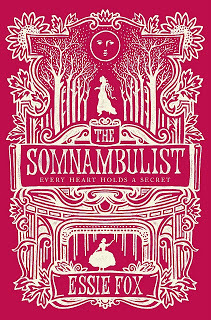
I must confess I have always had a liking for the Victorian and Edwardian periods, and when I was a costume designer I used to collect Victorian and Edwardian clothing. So I was somewhat surprised to find when I began writing that my own novels that they do not slot into that time frame. My enthusiasm for the period remains undimmed though.
I was excited to hear about the Virtual Victorian's new novel The Somnambulist, and when it popped up as a selection for Amazon Vine I could not resist.
And what a gem it is. Bravo to Essie Fox, it is a long time since I have enjoyed a debut novel so much. It is literate, engaging and atmospheric. What's more, it has a plot that kept me turning the pages, and just when I thought I had discovered all the secrets of the book, there was one more twist in the tale.
Phoebe's journey to uncover her past takes her from the glitz and glamour of the East End Music Hall stage to the deliciously spooky Dinwood Court, surrounded by dark woods and deep water, and haunted by the death of the daughter of the house, Esther.
From the book:
"Life is rarely perfect." My father continued. "We all make mistakes. The thing is to forgive, and," he paused at the sound of some high muffled laughter, the splashing of water, "and never forget."
Novels are rarely perfect, but this one very nearly is. Beg, buy or borrow it, for a reading experience you will find hard to forget.
Here's the blurb:
'Some secrets are better left buried...'
When seventeen-year old Phoebe Turner visits Wilton's Music Hall to watch her Aunt Cissy performing on stage, she risks the wrath of her mother Maud who marches with the Hallelujah Army, campaigning for all London theatres to close. While there, Phoebe is drawn to a stranger, the enigmatic Nathaniel Samuels who heralds dramatic changes in the lives of all three women. When offered the position of companion to Nathaniel's reclusive wife, Phoebe leaves her life in London's East End for Dinwood Court in Herefordshire - a house that may well be haunted and which holds the darkest of truths. In a gloriously gothic debut, Essie Fox weaves a spellbinding tale of guilt and deception, regret and lost love.
Every heart holds a secret...
Published on May 23, 2011 03:23
May 17, 2011
Tuesday Tip - Add complexity
Your story should be layered, just like life. There is no life-story that is not intersected by hundreds, if not thousands, of other life stories. All of these characters will have their own inter-relationships, but more importantly all will have their own imaginative life.
In writing fiction it is easy to forget that the character also has an imagination, perhaps a fictional life or an attachment to a certain story. To make a character complex and nuanced, we must tap into their imaginations as well as our own. I am just reading Essie Fox's The Somnambulist. She does this really well, the life that Phoebe's Aunt Cissy lives is more to do with what her imagination rests on, than it is to do with her mundane life.
Likewise, when I was writing "The Gilded Lily" the story of "Snow White and Rose Red" had profoundly affected the way the sisters felt they should behave towards each other, providing an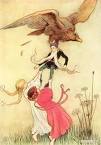 ideal which both struggled to maintain.
ideal which both struggled to maintain.
So delve into your characters imaginations. What might they fantasize about, what key stories have they heard, which book has affected them so much it has changed their life?
In writing fiction it is easy to forget that the character also has an imagination, perhaps a fictional life or an attachment to a certain story. To make a character complex and nuanced, we must tap into their imaginations as well as our own. I am just reading Essie Fox's The Somnambulist. She does this really well, the life that Phoebe's Aunt Cissy lives is more to do with what her imagination rests on, than it is to do with her mundane life.
Likewise, when I was writing "The Gilded Lily" the story of "Snow White and Rose Red" had profoundly affected the way the sisters felt they should behave towards each other, providing an
 ideal which both struggled to maintain.
ideal which both struggled to maintain.So delve into your characters imaginations. What might they fantasize about, what key stories have they heard, which book has affected them so much it has changed their life?
Published on May 17, 2011 02:25
May 14, 2011
Paperback Writer
 Paperback writer
Paperback writerDear Sir or Madam, will you read my book? It took me years to write, will you take a look? Based on a novel by a man named Lear, And I need a job, so I want to be a paperback writer, Paperback writer. It's the dirty story of a dirty man, And his clinging wife doesn't understand. His son is working for the Daily Mail, It's a steady job, but he wants to be a paperback writer, Paperback writer. Paperback writer.
It's a thousand pages, give or take a few, I'll be writing more in a week or two. I can make it longer if you like the style, I can change it round and I want to be a paperback writer, Paperback writer.
If you really like it you can have the rights, It could make a million for you overnight. If you must return it, you can send it here, But I need a break and I want to be a paperback writer, Paperback writer. Paperback writer, Paperback writer - Paperback writer, Paperback writer - Paperback writer.
Recorded: April 13, 1966 at Abbey Road, London, England
The Beatles - John Lennon - rhythm guitar, background vocals,Paul McCartney - lead vocal, bass guitar,George Harrison - lead guitar, background vocal,Ringo Starr - drums
Who would have thought it, the paperback of The Lady's Slipper is now available in some online stores. I haven't yet received my copies, but when I do I will be able to stop humming this tune at last!
Looking online I was surprised to see that this song has been ascribed various deeper meanings. According to one online forum it is a metaphor for prostitution - pertinent because the Beatles were being pressurized by their label and felt they were about to lose control over their product.
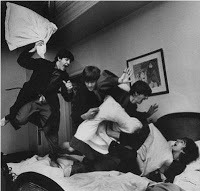 As writers if our books sell well we are also subject to market pressures to produce more of the "winning formula". If they don't sell well then we are perhaps advised to give up what we want to do in favour of following the example of other best-selling writers. What I particularly admire about the Beatles is the way they managed to re-invent themselves, shift and evolve with their current interests and yet still produce work of such enduring quality that not only sold in millions, but has remained iconic even now.
As writers if our books sell well we are also subject to market pressures to produce more of the "winning formula". If they don't sell well then we are perhaps advised to give up what we want to do in favour of following the example of other best-selling writers. What I particularly admire about the Beatles is the way they managed to re-invent themselves, shift and evolve with their current interests and yet still produce work of such enduring quality that not only sold in millions, but has remained iconic even now.
Published on May 14, 2011 02:36
May 10, 2011
The Tuesday Tip - A Visual Narrative
 If I'm ever stuck in my work in progress, or can't seem to generate enthusiasm to write, I go to Google and type in Narrative Painting as one of the keywords, and the period I'm interested in - in my case the 17th century. Trying it today, some of the first random images to come up were these:
If I'm ever stuck in my work in progress, or can't seem to generate enthusiasm to write, I go to Google and type in Narrative Painting as one of the keywords, and the period I'm interested in - in my case the 17th century. Trying it today, some of the first random images to come up were these:The work above is by Vermeer, this one by the Flemish painter Frans Snyders.
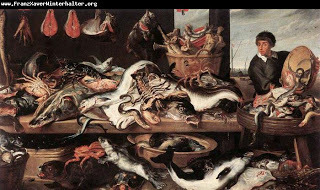
By writing around the character I see - a draughtsman or maybe a geometer looking out of the window, his attention caught by ....? Well what? Let your imagination supply the answer. I am particularly taken with the oriental rug which pehaps came from one of the places he is mapping. Has it just arrived? Is that why it is draped in the foreground like that? Where will it go next?
The second picture - well, what a variety of fish. In a world where mostly I see cod and haddock, and the occasional tuna sandwich, this is an eye-opener. Most of it looks as though it is writhingly alive. And what is that in the bottom left? An otter? My market scene has just taken on fresh vigour!
Sometimes all the imagination needs is a little stimulus - a prod, if you like. Questions are what oil our creative faculties, as it is human nature to want to resolve questions. Google Images supplies you with all the questions about your period that you need. It is at our fingertips, and is such a rich resource, especially for those writing historical fiction. Most writers have a visual narrative running in their heads which needs feeding. If the imagination is hungry, then go and feed it!
Published on May 10, 2011 02:49
May 9, 2011
The Long and the Short of it
Two recommended books from my recently read pile - one very short, (about109 pages, although it is so short the pages aren't numbered) the other much longer, 410 packed pages.
First - the short one.
Sum - Tales from the Afterlives by David Eagleman
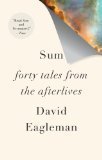 This is one of those books I long to give to any narrow-minded, fundamentalist bigot, with a fixed view of God and the cosmos. But I am fairly sure that there won't be any reading this blog, so it is a good job that it is also a mind-expanding read for the rest of us too.
This is one of those books I long to give to any narrow-minded, fundamentalist bigot, with a fixed view of God and the cosmos. But I am fairly sure that there won't be any reading this blog, so it is a good job that it is also a mind-expanding read for the rest of us too.
The book posits various afterlives as a series of short stories. What is genius about it is that it suggests what we might perceive as a good idea for an afterlife, but these nirvanas quickly reverse into making us think about, and appreciate, what we already have right here, right now.
For me it felt like opening the curtains and letting great gusts of fresh air into the room. Eagleman is a neuroscientist, but don't let that put you off - here is inventive spiritual questioning at its most sane.
Now, the long one.
The Redemption of Alexander Seaton by Shona McLean.
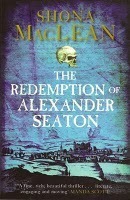 Dark, grisly,stuffed full of historical detail and the dour dialogue of 17th century Scotland, this is a thriller to read on a cold night with the wind howling outside and rain lashing at the windows.
Dark, grisly,stuffed full of historical detail and the dour dialogue of 17th century Scotland, this is a thriller to read on a cold night with the wind howling outside and rain lashing at the windows.
Alexander Seaton, a failed minister with a past, stumbles upon a murder. In pursuit of the killer and his own redemption he embarks upon a series of travels which take him through the terrors of the witch-hunt, the then-current obsession with Papists, and an encounter with his own demons.
Richly atmospheric, this is not a read for someone looking for a fast-moving plot, although there is plenty of detail to hold the interest. The characters, especially the unlikeable, bitter Alexander seep into the mind somehow, and this makes the final denoument gripping and satisfying.
First - the short one.
Sum - Tales from the Afterlives by David Eagleman
 This is one of those books I long to give to any narrow-minded, fundamentalist bigot, with a fixed view of God and the cosmos. But I am fairly sure that there won't be any reading this blog, so it is a good job that it is also a mind-expanding read for the rest of us too.
This is one of those books I long to give to any narrow-minded, fundamentalist bigot, with a fixed view of God and the cosmos. But I am fairly sure that there won't be any reading this blog, so it is a good job that it is also a mind-expanding read for the rest of us too.The book posits various afterlives as a series of short stories. What is genius about it is that it suggests what we might perceive as a good idea for an afterlife, but these nirvanas quickly reverse into making us think about, and appreciate, what we already have right here, right now.
For me it felt like opening the curtains and letting great gusts of fresh air into the room. Eagleman is a neuroscientist, but don't let that put you off - here is inventive spiritual questioning at its most sane.
Now, the long one.
The Redemption of Alexander Seaton by Shona McLean.
 Dark, grisly,stuffed full of historical detail and the dour dialogue of 17th century Scotland, this is a thriller to read on a cold night with the wind howling outside and rain lashing at the windows.
Dark, grisly,stuffed full of historical detail and the dour dialogue of 17th century Scotland, this is a thriller to read on a cold night with the wind howling outside and rain lashing at the windows.Alexander Seaton, a failed minister with a past, stumbles upon a murder. In pursuit of the killer and his own redemption he embarks upon a series of travels which take him through the terrors of the witch-hunt, the then-current obsession with Papists, and an encounter with his own demons.
Richly atmospheric, this is not a read for someone looking for a fast-moving plot, although there is plenty of detail to hold the interest. The characters, especially the unlikeable, bitter Alexander seep into the mind somehow, and this makes the final denoument gripping and satisfying.
Published on May 09, 2011 02:44
May 7, 2011
Lakes Writers School
Two of Cumbria's top writers – the award-winning children's writer Janni Howker and novelist Sarah Hall – will be running workshops at the next Lakes Writers School course, 16-20 May 2011. They will be teaching on:
The Essential Elements of Creative Writing, including Conquering Point of View, The Joy of Telling the Truth, and The Power of the First Person Narrative.
Other speakers on the course include Cumbrian poet Angela Butler, ghostwriter Andrew Chamberlain and commissioning editor Ali Hull.
Any local authors who want to improve their creative skills are welcome to come along, either on a residential basis or as day visitors. The course, which has been running twice a year since 2003, aims to help writers at all stages, from beginners through to published authors. It takes place at Lands End, Watermillock. For more information, go to http://www.lakesschool.com/
For more information on the course, phone Ali Hull on 07977 670868 or Mark Finnie on 07917631785
Note for editors – to talk to the course organisers, phone Ali Hull on the above number or Mark Finnie on 01768 863331
The Essential Elements of Creative Writing, including Conquering Point of View, The Joy of Telling the Truth, and The Power of the First Person Narrative.
Other speakers on the course include Cumbrian poet Angela Butler, ghostwriter Andrew Chamberlain and commissioning editor Ali Hull.
Any local authors who want to improve their creative skills are welcome to come along, either on a residential basis or as day visitors. The course, which has been running twice a year since 2003, aims to help writers at all stages, from beginners through to published authors. It takes place at Lands End, Watermillock. For more information, go to http://www.lakesschool.com/
For more information on the course, phone Ali Hull on 07977 670868 or Mark Finnie on 07917631785
Note for editors – to talk to the course organisers, phone Ali Hull on the above number or Mark Finnie on 01768 863331
Published on May 07, 2011 02:21



